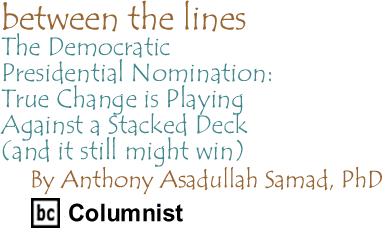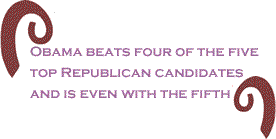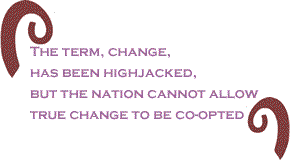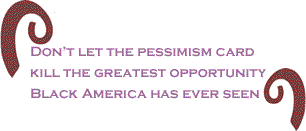
|
|||||||||||||||||||||
 |
|||||||||||||||||||||
 |
||||||||||
|
||||||||||
|
The current issue is always free to everyone If
you need the access available to a |
||||||||||
 |
||||||||||
 |
||||||||||
 |
||||||||||
After the first Democratic primaries (or caucuses) for the party’s nomination, one thing has become real clear: the discussion about how to change the country has become an engagement on how to “spin” the country. What started out as a real conversation about change, has evolved into a press on which “buzz words” evoke the most passion in voters. If you want to say that some of the candidates are now trying to trick the voters - that would be a fair statement. Along with this is a “not so subtle” media bias that is trying to make sure the status quo prevails. While we all have our preferences, we still must be fair in our analysis. My preference is Obama - not (just) because he’s Black but because he has the most salient, unifying message. I also see Obama as the most likely candidate to beat the Republican nominee next November. This country can’t afford another eight years of Republican rhetoric on the war and the economy - while the profiteers rape the nation’s coffers. Hilary
Clinton invigorates every segment of the Republican Party
base and loses to ALL of the Republican candidates in a national
election. Why? Because they don’t see her as Hilary, they
see her as “Billary” - an extension of her husband, former
President Bill Clinton, and so far that analysis has played
true. After losing in In the
meantime, Obama beats four of the five top Republican candidates
and is even with the fifth. An American public that wants
change can’t lose sight of the end game by getting twisted
in the primary mix. And we can’t afford a Democratic Party
without a message. Only one candidate in either major party
had a resonating message going into the Now, after
three Democratic contests in
The
first marked card in the deck is this “tag-team” act being
pulled off by the The second
marked card in the deck is the media that continues to miscall
the post-election analysis - particularly as it relates to
voter behavior and Barack Obama. Both in
Consider three things that have occurred since Iowa:
Obama's “Reagan was change” comments was really a stretch, given that the Reagan Revolution was spurred out of a racial backlash of the social gains of the 1960s and 1970s and represented a social and economic retraction that produced the highest unemployment among African Americans since the Great Depression. Obama, trying to court Reagan Democrats, has to be careful that his examples of philosophical change are relevant to the true spirit of his change message. The Reagan example wasn’t, but with so many people talking change now, he was just trying to “outchange” the change parrots who are parroting his message. Polly can want a cracker, but you don’t have to give it. Make ‘em earn it. If they want to repeat “change,” make ‘em come with substantive examples. The
third marked card in the deck is this move to make Obama “a black
candidate.” The question as to whether Barack is black enough
has been asked and answered. His crossover appeal is unprecedented
as his message resonates with all races and classes. The
media is trying to say that the
We know political change in this country is playing against a stacked deck of asceticism, cynicism, despotism, narcissism, racism, symbolism, parasitism and plain ole’ xenophobic extremism that seek to distort the view of what real change is and what it represents. If we can play past all marked cards in the deck of historical American politics, true change can still win. BlackCommentator.com Columnist Dr. Anthony Asadullah Samad is a national columnist, managing director of the Urban Issues Forum and author of the new book, Saving The Race: Empowerment Through Wisdom. His Website is AnthonySamad.com. Click here to contact Dr. Samad. |
||||||||||
| January 24, 2008 Issue 261 |
|
| Executive Editor: Bill Fletcher, Jr. |
| Publisher: Peter Gamble |
| Printer Friendly Version in resizeable plain text format format |
 |
 |
 |
 |
| |
| |































